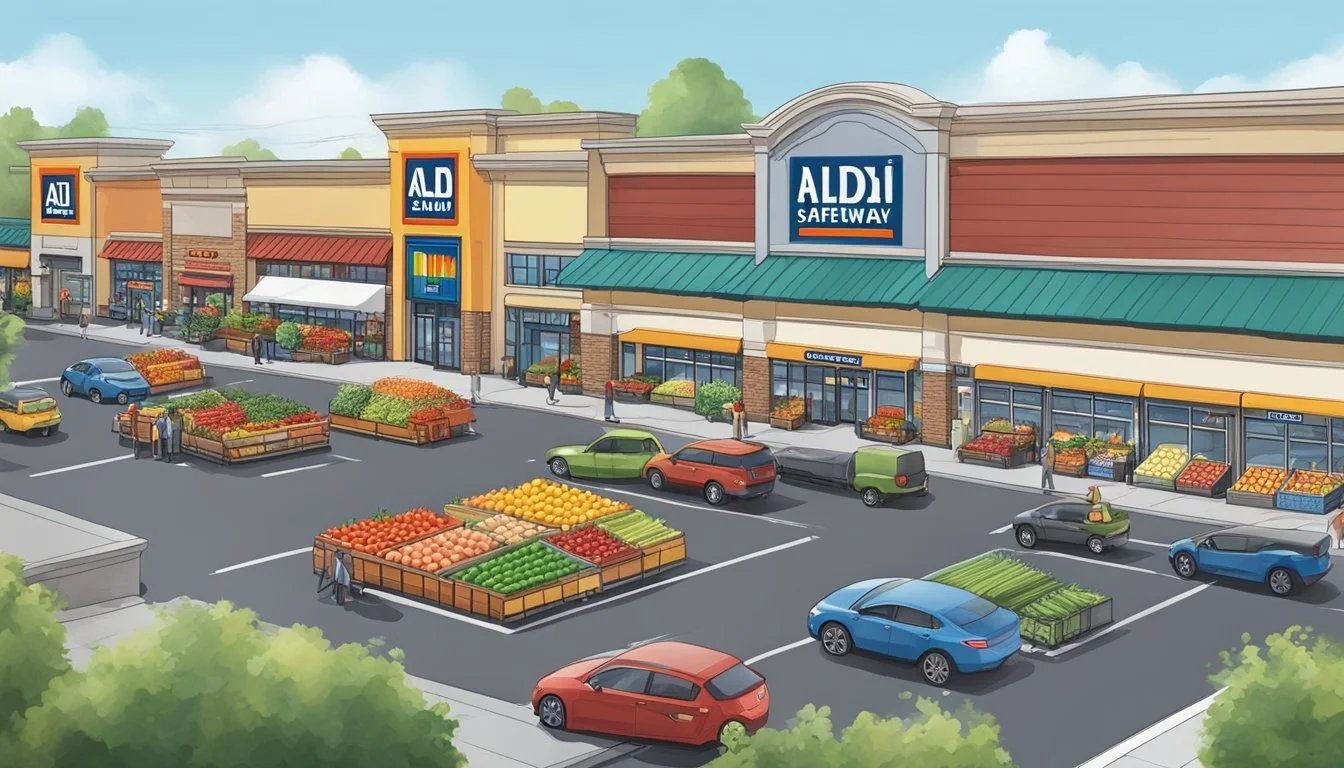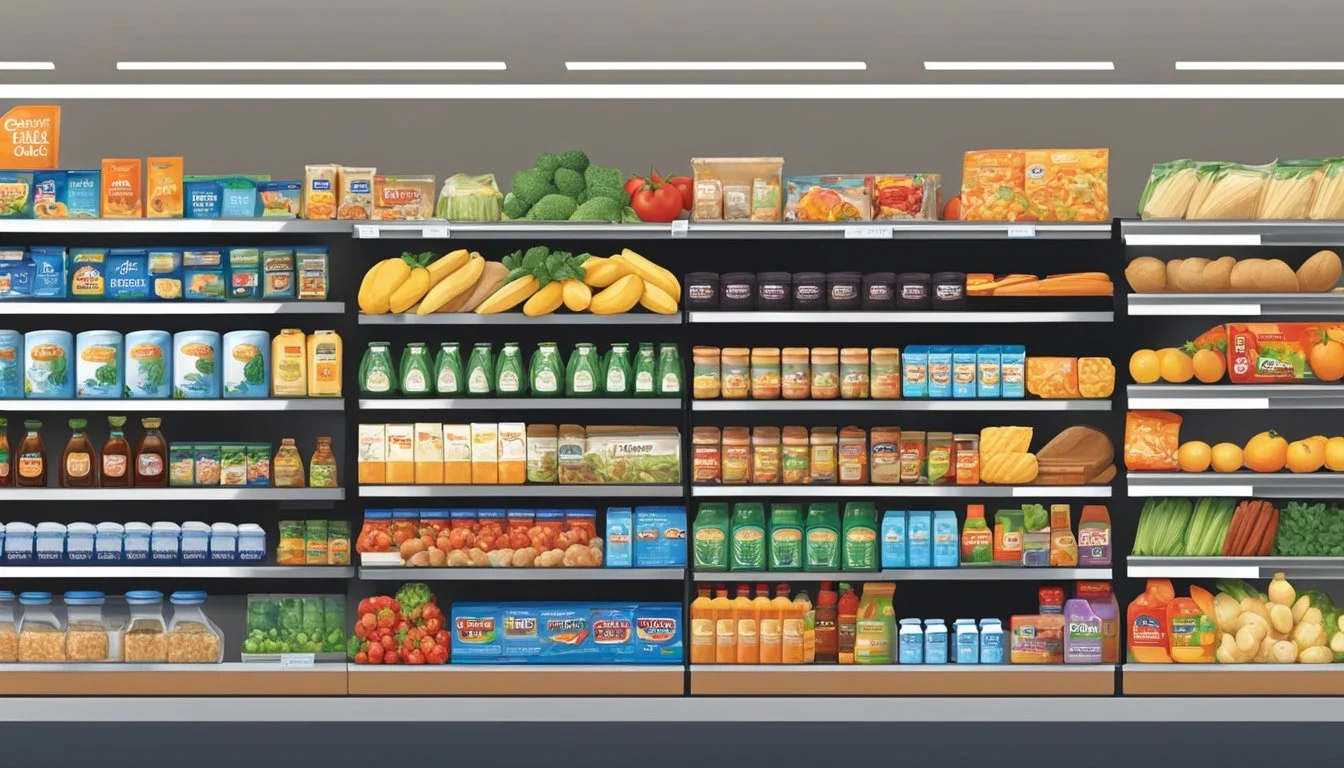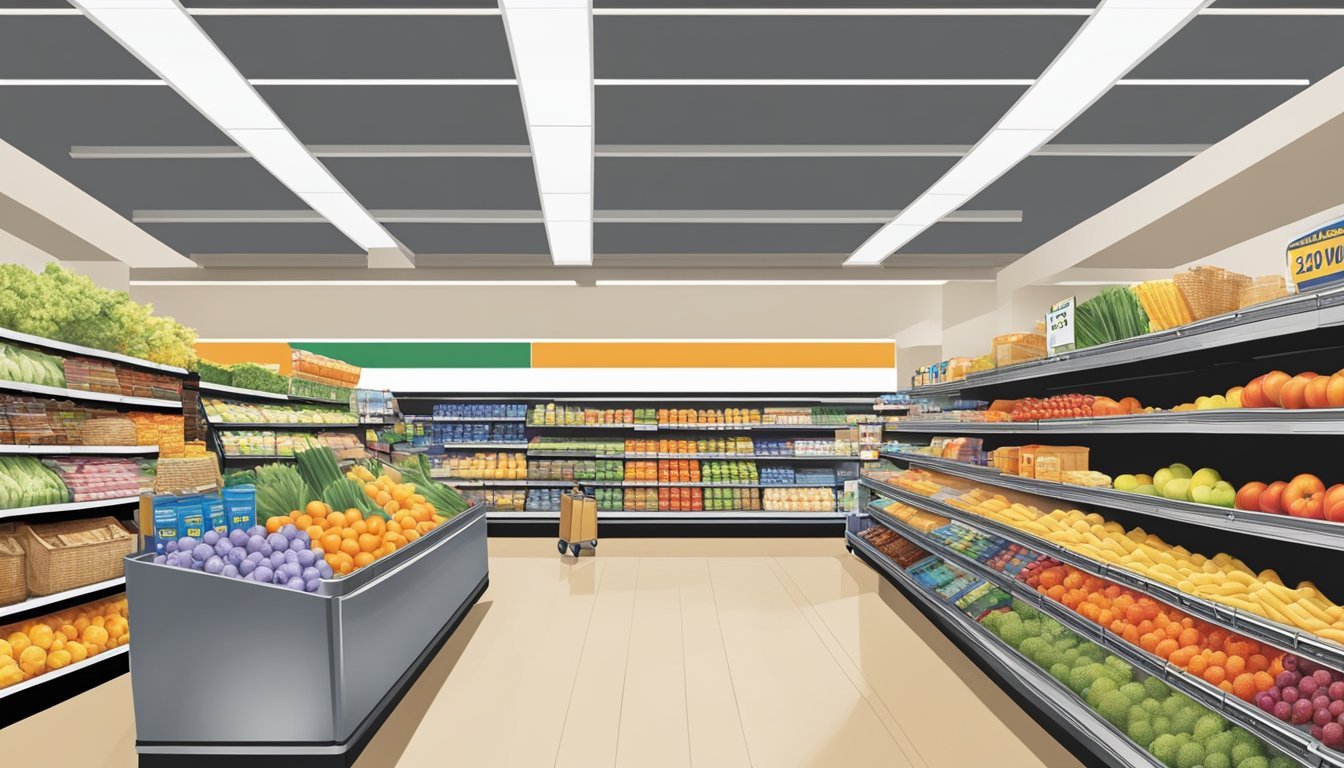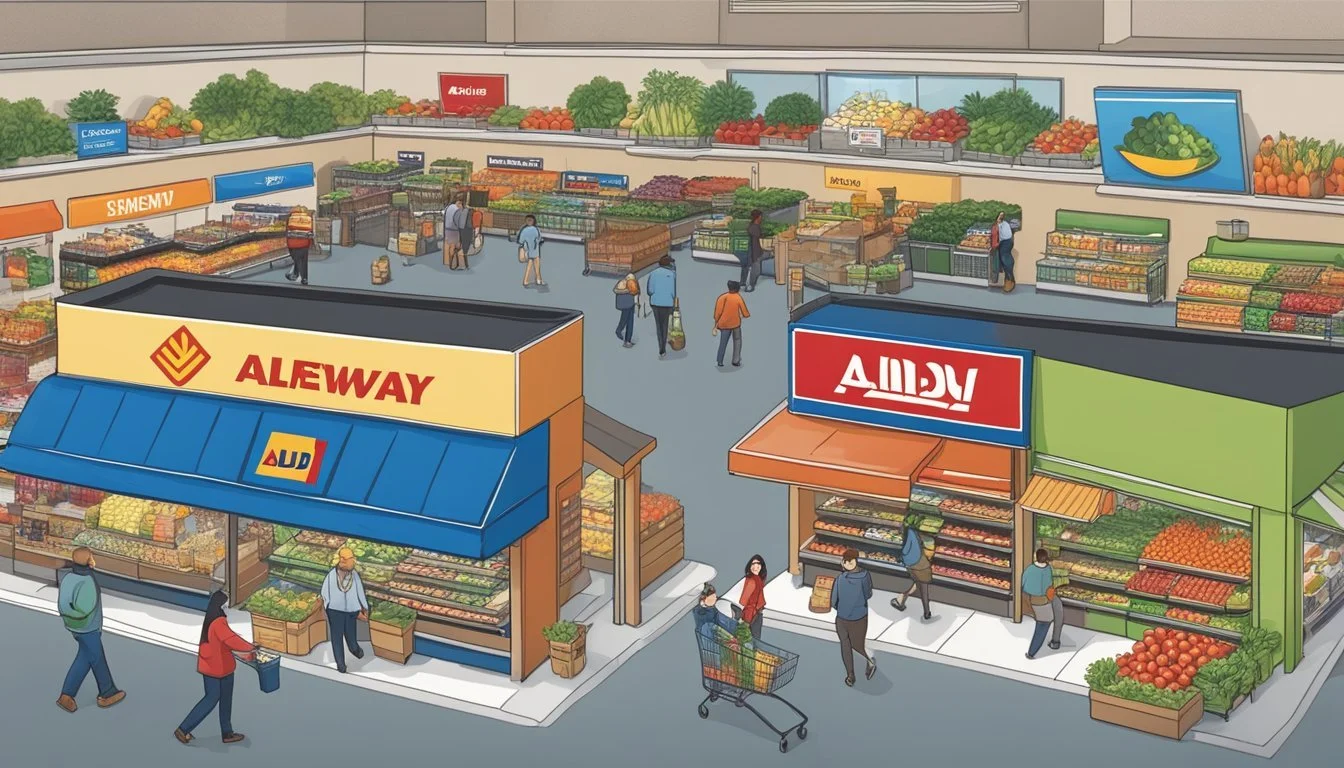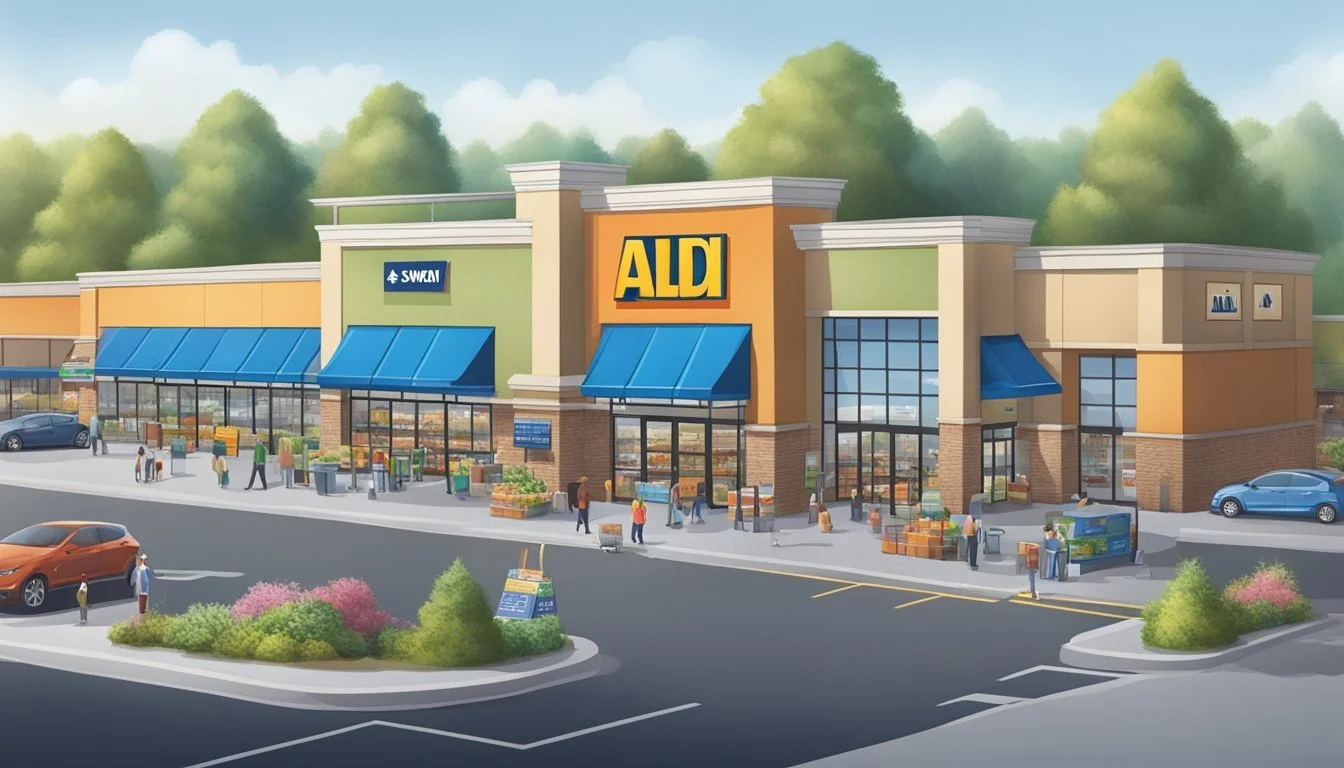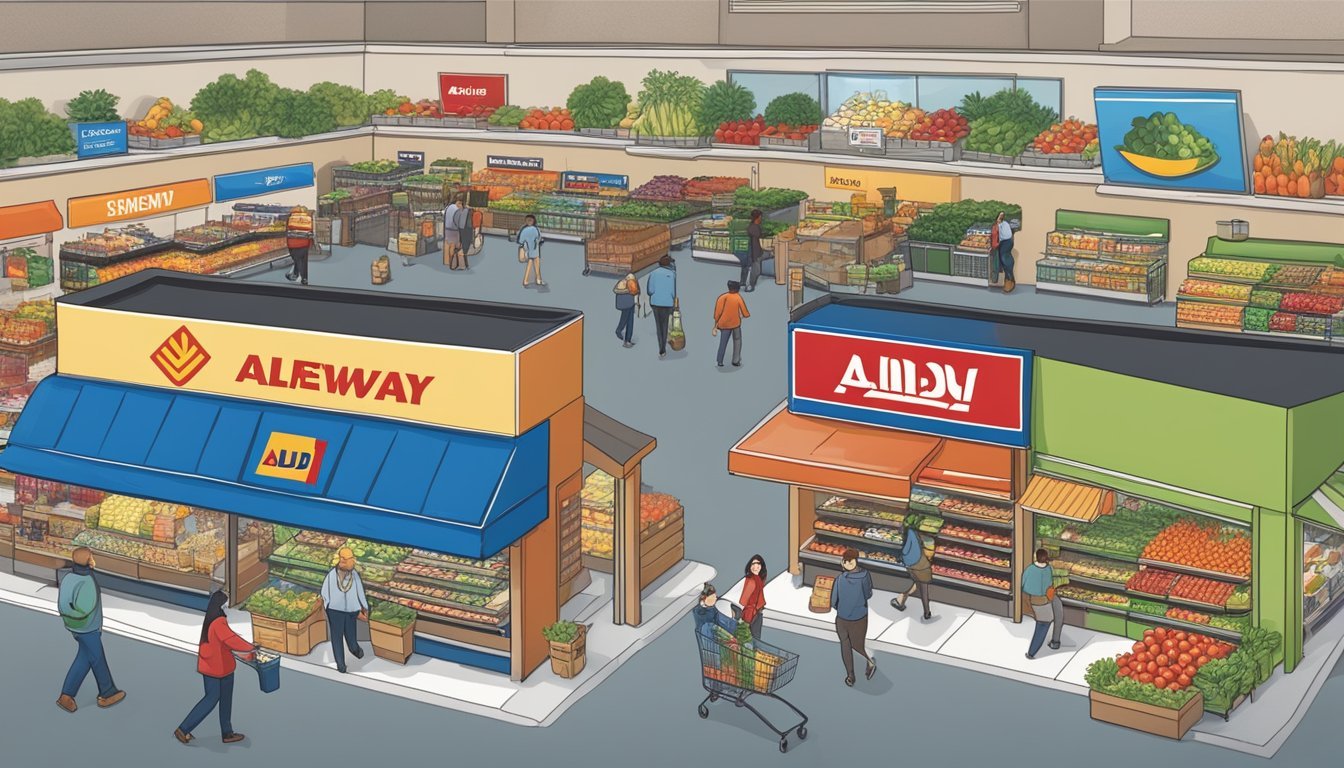Aldi vs Safeway
Comparing Prices, Quality, and Shopping Experience
Comparing Aldi and Safeway offers insights into the diverse experiences consumers have at these grocery stores. Aldi, a global discount supermarket chain, has garnered a reputation for its no-frills shopping experience and significantly lower prices. Recognized for its cost-efficient strategies, Aldi often displays products in their original cardboard shipping boxes and encourages customers to bring their own bags, passing the savings on to the shopper.
Safeway, on the other hand, is a traditional grocery store known for a wide range of products, including specialty items and a substantial selection of organic and prepared foods. While prices at Safeway might be higher compared to Aldi, it provides a different value proposition through enhanced shopping experiences, such as in-store bakeries, delis, and a larger selection of on-the-go meal options. Both grocery chains serve distinct customer needs and preferences, highlighting the importance of value, variety, and convenience in the marketplace.
Overview of Aldi and Safeway
Aldi is a global supermarket chain known for its cost-effective approach to grocery shopping. Founded by the Albrecht brothers in Germany, Aldi operates on a no-frills philosophy, offering a range of staple items, including their own brand products, at low prices. This strategy allows them to maintain high customer traffic while keeping overhead costs minimal. The supermarket has expanded internationally and, as of now, has over 1300 stores across 32 states in the United States.
Founded: Germany
Store Count in the US: Over 1300
Operating States: 32
Shopping Experience: Utilitarian, focus on cost-saving
Safeway, on the other hand, is a well-established American supermarket chain that offers a variety of national brands along with its private labels. Safeway emphasizes customer service and shopping experience, with a broader selection of products compared to Aldi, including specialty items, prepared foods, and organic options. These features contribute to a different pricing and market positioning aimed at a different segment of consumers than Aldi.
Founded: American grocery store
Product Range: Wide selection including specialty and organic options
Customer Focus: Service and shopping experience
Each of these supermarkets tailors to different customer needs: Aldi typically attracts cost-conscious shoppers looking for discounts and bulk savings, while Safeway appeals to those who prioritize product variety, brands, and a more conventional shopping experience. They both play significant roles in the US grocery market, yet cater to distinctly different shopping preferences.
Pricing Comparison
When assessing the pricing landscape between Aldi and Safeway, shoppers typically find that Aldi offers more consistently low prices. Aldi's business model is based on a no-frills shopping experience, high volume sales of primarily store-brand products, and minimal staff to reduce overhead costs. These savings are then passed on to the consumers.
Aldi is known for its cost-saving strategies, which include a smaller store footprint and a heavy emphasis on private labels. As a result, prices at Aldi are often considerably lower than at Safeway. Aldi's rotating selection of "loss leaders"—items sold at a loss to draw customers in—also contributes to the perception of savings and low prices.
On the other hand, Safeway offers a broader range of national brands and a more traditional shopping experience, which sometimes includes higher pricing to cover the additional services and wider selection. Safeway does offer discounts through club cards and special sales, but their regular pricing generally doesn't match Aldi's low-cost model.
To illustrate, consider the following price comparison:
Item Aldi Price Safeway Price Milk, 1 gallon $2.49 $3.19 Bread, 1 loaf $1.39 $2.29 Eggs, dozen $0.99 $1.99
The table shows that basic staples are cheaper at Aldi, which can lead to significant savings over time for shoppers. It is therefore not uncommon for shoppers on a budget to prefer Aldi for everyday groceries. However, Safeway may attract customers through frequent shopper discounts and promotions that can offer competitive pricing on select items.
Product Assortment and Brands
When comparing the offerings of Aldi and Safeway, customers will notice a stark contrast in the strategic approach to product assortment and brands between these two grocery retailers.
Aldi prides itself on a curated selection that emphasizes their store brands. It carries a diverse range of private label products which often match or surpass the quality of national brands. The store's layout is designed for efficiency, with limited choices in each category but a focus on quality and value.
Example Aldi Brands:
Simply Nature: Organic and non-GMO products
liveGfree: Gluten-free options
In contrast, Safeway offers a vast selection including numerous national brands as well as its own store brands. Safeway understands that consumers often have specific brand loyalties or preferences and facilitates that diversity.
Notable Safeway Brands:
O Organics: Organic foods
Signature Select: Wide range of general merchandise
Here's a comparative glance:
Feature Aldi Safeway Product Variety Limited selection prioritizing store brands Extensive variety including both store and national brands Store Brands High-quality alternatives to national brands Balanced mix of store brands and national brands National Brands Fewer options, focus on cost-saving Comprehensive selection catering to brand preferences
Aldi's streamlined approach allows them to deliver high-quality store brands at lower prices, often viewed as comparable or superior to name brands. Safeway's strategy is to offer a broader selection, including store brands that provide quality and value, while also accommodating those who prefer traditional national brands.
Quality of Goods
When comparing the quality of goods between Aldi and Safeway, consumers will notice some differences, especially in the variety and sourcing of products.
Aldi has built a reputation for offering high-quality private label items that are often comparable to national brands. Their focus on cost-efficiency does not typically impede the quality of their goods.
Produce: Their selection might be more limited and some shoppers have reported variability in the freshness of fresh fruits and vegetables.
Meat: Generally good quality, especially considering the price point.
Organic Produce: Available and competitively priced.
Baked Goods: Adequate selection, with varying opinions on quality and freshness.
Safeway, on the other hand, often offers a broader range of brands, including premium and organic options.
Produce: Safeway typically maintains a vast array of fresh vegetables and high-quality produce, sourced both locally and globally.
Meat: A wide selection of meats, including specialized cuts and organic options.
Baked Goods and Prepared Foods: Safeway often boasts an extensive selection, known for variety as well as quality.
Both stores offer their own take on quality, with Aldi focusing on value and efficiency, and Safeway providing a more traditional grocery experience with a diverse product selection. Shoppers' preferences for organic foods, fresh fruit and vegetables, and general food quality will guide their choice between Aldi and Safeway.
Store Layout and Shopping Experience
When comparing Aldi and Safeway, customers might notice distinct differences in store layout and shopping experience.
Aldi boasts a no-frills layout designed to enhance efficiency. Stores typically feature a straightforward, grid-like arrangement that facilitates quick shopping trips. While Aldi focuses on exclusive brands and a smaller selection, this allows for a more simplified, albeit limited, choice. Shoppers often appreciate the clean appearance and the emphasis on quick in-and-out access.
On the other hand, Safeway offers a more conventional supermarket layout with wider aisles and a greater variety of both national brands and private-label products. This setup encourages leisurely browsing and provides a more traditional shopping experience. Safeway stores are known for their cleanliness and additional services, such as in-store bakeries, delis, and pharmacies, which contribute to a comprehensive shopping environment.
In terms of services, Safeway tends to have a more robust offering. They may include specialty sections like gourmet cheese counters, organic produce areas, and prepared food stations. These conveniences can cater to a customer's needs for quality and variety, but they may also reflect in the pricing.
Customers value different aspects of the shopping experience. Aldi's efficient design can lead to shorter trips and potentially lower costs, suited for budget-conscious shoppers. Safeway's broader services provide a one-stop shop for those who prioritize variety and an all-inclusive experience over a quick shopping trip.
Careful consideration of store layout and cleanliness can significantly impact a customer's decision between Aldi and Safeway. While Aldi adopts a minimalist approach, Safeway provides an extensive array of choices and amenities.
Location and Convenience
When considering Aldi and Safeway in terms of location and convenience, both supermarket chains offer distinctive advantages. Aldi, originating in Germany, extends its reach across the United States with over 1,300 stores in 32 states. Known for its cost-effective approach, Aldi's expansion primarily targets suburban areas and is becoming increasingly accessible in metro areas.
Safeway, on the other hand, boasts a strong presence in the United States as a long-standing supermarket chain. With numerous stores situated for easy access within residential neighborhoods and near other shopping conveniences, Safeway often positions itself as a go-to grocery destination for many shoppers.
Here is a simple comparison of their spread within urban vs. suburban areas:
Aldi Safeway Urban Areas Expanding Well-established Suburban Predominant Common
While Aldi's locations might be sparse in some regions, they strategically place stores to cater to their target market. Convenience for Aldi shoppers is attributed to store layout simplicity and location strategy, making the shopping experience quick and efficient. Safeway stores are typically larger and offer a wider range of services and products, which can be more convenient for a one-stop shopping experience.
In conclusion, the accessibility of either Aldi or Safeway can greatly vary depending on the individual's location and shopping preferences. Each chain has its unique approach to providing convenience to its customers, from store placement to in-store shopping experience.
Customer Service
When comparing Aldi and Safeway in terms of customer service, shoppers have varied experiences at both retailers.
Aldi's straightforward layout and efficient checkout process often lead to shorter wait times. Customers self-bag their purchases, which can speed up the checkout experience. However, this does mean that those who require assistance may find it less easily available. They offer a Double Guarantee, where if a customer is not satisfied with a product, Aldi not only replaces the item but also refunds the purchase price.
Safeway, conversely, is known for a broader range of services. They typically have a larger number of staff available on the floor, which can translate to more immediate assistance for shoppers in locating items or getting answers to questions. Some stores offer personalized services, such as a deli, bakery, pharmacy, and sometimes even a Starbucks.
Feature Aldi Safeway Checkout Speed High Moderate Staff Availability Low High Additional Services Few Many
Neither grocery store is universally superior in the realm of customer service; it heavily depends on customer priorities. For someone valuing speed and efficiency, Aldi may edge ahead. For customers desiring a broader range of in-store services and more staff interaction, Safeway could be preferable. It should be noted neither store generally offers free returns and exchanges – a notable point for customer service considerations.
Special Offers and Discounts
When shopping for groceries, finding stores with the most valuable discounts and coupons can lead to significant savings for consumers. Aldi and Safeway each have their unique approach to providing deals that are worth considering.
Aldi is known for its cost-effectiveness, largely due to its no-frills shopping experience which translates into savings. They offer consistently low prices and discounts on on-sale items, which rotate weekly. Aldi's discounts are typically applied directly to their products, making them one of the more straightforward retailers when it comes to savings.
Safeway, on the other hand, offers a more traditional array of coupons and promotional discounts. Shoppers can benefit from using Safeway's mobile app, which provides personalized deals and digital coupons, including discounts on on-sale items. Moreover, Safeway's loyalty program can lead to additional savings as members accumulate points that can be redeemed on future purchases.
Offers Aldi Safeway Weekly Discounts Rotating selection Varies by store and region Coupons No Available through mobile app Loyalty Program No Yes, with points accumulation
It's essential for consumers to decide which store's offer aligns with their shopping preferences. Some may prefer Aldi for its no-fuss, consistently low prices, while others may choose Safeway for the potential to stack coupons and earn loyalty points.
Loyalty and Rewards Programs
When comparing the loyalty programs of Aldi and Safeway, customers will find distinct approaches that cater to different shopping preferences.
Aldi does not have a traditional loyalty program, but it offers a system where shoppers can earn points towards rewards with each purchase. Additionally, Aldi customers can utilize their app for a more convenient shopping experience, which includes features such as a shopping list and digital coupons. The app also supports Aldi's Curbside Grocery Pickup service at participating locations.
Safeway, on the other hand, operates a more structured loyalty program known as Just for U. This program provides personalized deals and discounts based on the customer's shopping habits. Safeway shoppers earn points for each dollar spent, which can then be redeemed for discounts on groceries or gas at participating stations. To manage rewards, Safeway customers can use the Safeway app, which delivers a seamless integration of the loyalty program alongside features like digital coupons and a shopping list.
Feature Aldi Safeway Points System Earns points toward rewards Points per dollar spent Discounts Digital coupons via app Personalized deals Mobile App Shopping list, coupons Loyalty program access, coupons, list Pickup Service Curbside pickup at select locations -
Both grocery chains leverage their rewards programs to enhance customer satisfaction and build loyalty. Aldi's approach focuses on ease and simplicity, while Safeway offers a more traditional, points-based loyalty system that rewards frequent shoppers with various types of savings.
Brand Reputation and Market Presence
Aldi and Safeway are prominent players in the supermarket sector, each with its own strengths in brand reputation and market presence.
Aldi, a Germany-based chain, has cultivated a strong image for offering affordable groceries through a no-frills shopping experience. Its private label products often exceed customer expectations in both quality and cost savings, which reinforces the brand's reputation. The retailer operates over 2,000 stores in the United States and is recognized for its efficiency and discount pricing strategy.
Market Presence: High
Reputation: Cost-effective, Quality private labels
Safeway, on the other hand, is a well-established American supermarket chain with a significant presence, especially in the Western and Central United States. Its brand is associated with a wide variety of products, including name-brand and specialty items. Offering a more conventional grocery shopping experience compared to Aldi, Safeway has approximately 900 locations and is known for its promotional deals and loyalty programs.
Market Presence: Moderate
Reputation: Diverse product range, Customer loyalty programs
Both retailers have adapted to market changes and consumer preferences which is reflected in their sustained growth and customer loyalty. Supermarket chains like these emphasize different aspects — Aldi prioritizes cost-efficiency and simplified choices, while Safeway offers a broader range of products, catering to diverse consumer needs.
It should be noted that brand perception and market presence do not solely determine a grocery store's overall appeal, but they play pivotal roles in influencing shopper decision-making. As each retailer continues to evolve, they maintain a competitive edge in the bustling retail grocery market.
Comparative Analysis of Grocery Chains
This section examines the performance and offerings of Aldi and Safeway, diving into how they stack up against a variety of other grocery stores.
Comparison with Other Grocery Stores
When assessing Aldi against grocery giants like Walmart and Kroger, Aldi is often celebrated for its low prices. Shoppers have consistently found Aldi's pricing to be competitive, particularly when compared to Walmart, which prides itself on affordability. Aldi's business model focuses on a limited assortment of private-label items, enabling it to undercut competitors on price.
In contrast, Safeway, known for a broader selection of goods, including a variety of national brands, often has higher price points compared to Aldi. However, Safeway customers benefit from a more traditional supermarket experience, with a wider array of products and a focus on customer service.
Trader Joe's, another direct competitor, is renowned for its unique product offerings, with many items being exclusive to its stores. The comparison with Whole Foods Market pivots on quality, with Whole Foods emphasizing organic and natural products, often at a higher cost.
Target and Amazon, who have expanded their grocery offerings in recent years, aim to provide convenience by integrating groceries with a larger inventory of goods. Costco and Sam's Club, as membership-based warehouse clubs, offer bulk purchases at discounted rates. In contrast, regional chains like Publix and Wegmans focus on customer service and regional product selections.
Regional Store Comparisons
Aldi and Safeway serve different regions with varying levels of dominance. In the Northeast, for instance, Stop & Shop is a significant regional player and often a direct competitor to Safeway, with more than a century of operation. On the West Coast, Safeway competes with regional favorites like Sprouts Farmers Market and Stater Bros.
On the other hand, WinCo and FoodMaxx have emerged as budget-friendly options in the West, often rivaling Aldi in price. Food Lion and Hannaford serve the Southeast and parts of the Northeast respectively, providing region-specific selections that appeal to local tastes and preferences.
While Aldi has a smaller footprint in terms of store size and product variety, it has carved out a niche for cost-conscious shoppers. Safeway, with its larger stores and a greater selection of goods, appeals to customers seeking a one-stop shopping experience.
Through these comparisons, each store caters to specific customer needs, whether it's price, product variety, or shopping convenience.
Consumer Surveys and Reports
In evaluating the performance of grocery stores, Consumer Reports and various consumer surveys provide compelling insights. These surveys typically evaluate stores based on criteria such as product quality, price, customer service, and overall shopping experience.
A survey among area consumers revealed distinct preferences when it comes to shopping for groceries. Reports generated from these surveys help to assess the attributes of stores like Aldi and Safeway, often leading to a comprehensive understanding of their market position.
For instance, Aldi has often been recognized for its cost-effectiveness, catering to budget-conscious shoppers. The store's business model emphasizes high-quality products at low prices, a feature prominently recognized in numerous consumer surveys. Aldi's compact store layout and private-label goods contribute to its ability to maintain low prices without compromising on quality.
On the other hand, Safeway has been commended for its wide selection of brand-name items and a larger variety of organic products. Surveys focusing on customer experience often highlight Safeway's commitment to providing a more traditional supermarket experience, with a full-service deli, bakery, and a plethora of ready-to-eat options.
The table below summarizes the key attributes highlighted in consumer surveys and reports:
Feature Aldi Safeway Prices Competitive, often lower Variable, typically higher Product Quality High on private labels High on brand-names and organics Customer Service Efficient, less personalized More traditional, full service Store Layout Simpler, easy to navigate More complex, wider selection
These surveys holistically evaluate stores, enabling consumers to make informed decisions based on the aggregated experiences of a larger sample size. They act as a barometer indicating the strengths and weaknesses of each grocery store within the competitive landscape.
Economic and Environmental Impact
Aldi has made strong strides in both economic and environmental aspects of its operations. It stands out for its effective cost-saving strategy which includes a 'no-frills' approach and a focus on private label items. This cost-efficiency has contributed significantly to its economic impact, positioning Aldi as one of the fastest-growing grocery stores in the U.S. and a competitive retailer in terms of pricing, which translates to economic benefits for consumers seeking value.
From the environmental perspective, Aldi has been recognized for its sustainability efforts. It is working towards sustainability by offering sustainable product lines and relying on sustainable energy practices. Aldi's commitment to environmental protection is evidenced by its recognition from the Environmental Protection Agency (EPA).
Safeway, on the other hand, has been a staple in American grocery shopping for many decades. Economically, Safeway had made a notable impact in markets like Chicago through its Dominick's brand, though it had to make strategic closures, reflecting the volatility and competitive nature of the grocery market.
Environmentally, Safeway has taken steps to integrate sustainable practices, although specifics on their energy policies and sustainable product lines are less prominent in public-facing reports. As a longstanding player in the grocery industry, Safeway has contributed to local economies but also faces the ongoing challenge of aligning economic practices with increasing environmental concerns.
Aspect Aldi Safeway Economic Impact Expanding rapidly, competitive pricing, cost-efficient strategies, and increased consumer value. Long presence, strategic closures reflecting market challenges. Environmental Impact Sustainable product lines, sustainable energy usage, EPA recognition. Prioritizes sustainable practices, details less publicized.
Conclusion
When considering Aldi and Safeway as options for grocery shopping, consumers weigh various factors such as price, quality, savings, and the needs of their family. Aldi is renowned for its cost-effectiveness and efficient shopping experience, appealing to budget-conscious shoppers. It offers private label brands that often rival national brands in quality.
Safeway, on the other hand, provides a broader selection, including premium brands and a variety of organic choices, which may cater to those prioritizing variety or specific dietary preferences. It frequently offers promotional deals and a loyalty program that can lead to substantial savings over time.
Cost Comparison:
Aldi: Private label products; generally lower prices
Safeway: National brands; competitive prices with loyalty discounts
Quality and Selection:
Aldi: Consistent quality with a focus on private labels
Safeway: Wide range of products including organic and specialty items
Ultimately, the choice between Aldi and Safeway comes down to individual shopping priorities. For families looking to stretch their dollar while maintaining good quality, Aldi may be the preferred choice. Those who value a wider selection and brand variety, and who are keen to utilize loyalty rewards, might find Safeway more suitable. The decision between these two grocery stores hinges on the balance a shopper seeks between saving money and having access to a diverse array of grocery items.

